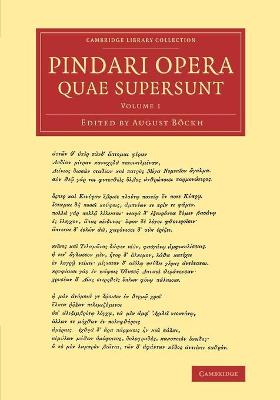Cambridge Library Collection - Classics
1 primary work • 6 total works
Volume 1
One of the foremost scholars of his day, the German classicist August Böckh (1785–1867) was chosen by the Berlin Academy of Sciences as the first editor of the monumental Corpus inscriptionum graecarum. Before that he had published this groundbreaking edition of the extant works of the Greek poet Pindar (c.522–c.443 BCE) in two volumes, the second being split into two parts. This first volume, published in 1811, contains the only complete surviving works of Pindar, the victory odes (Epinikia), written to celebrate athletic successes at the Olympic and other games. In addition to the editor's Latin preface and critical notes, this volume also contains his important treatise on Pindarian metrics, De metris Pindari, in which he establishes a close connection between Greek music and verse, elucidating the Greeks' own statements about rhythm and providing a systematic basis for the study of Greek verse.
One of the foremost scholars of his day, the German classicist August Boeckh (1785-1867) was chosen by the Berlin Academy of Sciences as the first editor of the monumental Corpus inscriptionum graecarum. Before that he had published this groundbreaking edition of the extant works of the Greek poet Pindar (c.522-c.443 BCE) in two volumes, the second being split into two parts. The first volume, published in 1811, contains the only complete surviving works of Pindar, the victory odes (Epinikia). In addition to the editor's Latin preface and critical notes, this volume also includes his important treatise on Pindarian metrics, De metris Pindari, in which he establishes a close connection between Greek music and verse. The first part of the second volume (published in 1819) comprises Greek scholia, and the second part (1821) contains the editor's Latin translations and commentary, as well as other fragments and indexes.
One of the nine canonical Greek lyric poets, Pindar (c. 522-443 BCE) has enjoyed a brilliant reputation since antiquity. Notoriously challenging but widely respected, Pindar's poetry has been increasingly studied in modern times. In the late nineteenth century, C. A. M. Fennell (1843-1916), a classicist and Fellow of Jesus College, Cambridge, turned his attention to Pindar's Nemean and Isthmian odes. First published in 1883 but released in a new edition in 1899, this book features an introduction focusing on the practical aspects of the pentathlon, which sets a good grounding for the comprehension of the odes themselves. Touching on metrical structure, this edition then presents each ode in its original Greek, accompanied by an individual, detailed introduction and full commentary. This fascinating work will be of value to advanced students of Greek grappling with the intricacies of Pindar's complex poetry.
One of the foremost scholars of his day, the German classicist August Boeckh (1785-1867) was chosen by the Berlin Academy of Sciences as the first editor of the monumental Corpus inscriptionum graecarum. Before that he had published this groundbreaking edition of the extant works of the Greek poet Pindar (c.522-c.443 BCE) in two volumes, the second being split into two parts. In the first volume Boeckh had presented Pindar's victory odes (Epinikia), the only complete surviving works by the poet, alongside his own Latin treatise on metrics and extensive critical notes. In this first part of the second volume, published in 1819, the editor includes a lengthy Latin preface followed by the ancient Greek - primarily Alexandrian - scholia taken from the Codex Vratislaviensis. These commentaries on Pindar's works, by such writers as Aristarchus, Chrysippus, Aristodemus and Didymus, are also accompanied by the editor's notes.
One of the foremost scholars of his day, the German classicist August Boeckh (1785-1867) was chosen by the Berlin Academy of Sciences as the first editor of the monumental Corpus inscriptionum graecarum. Before that he had published this groundbreaking edition of the extant works of the Greek poet Pindar (c.522-c.443 BCE) in two volumes, the second being split into two parts. This first volume, published in 1811, contains the only complete surviving works of Pindar, the victory odes (Epinikia), written to celebrate athletic successes at the Olympic and other games. In addition to the editor's Latin preface and critical notes, this volume also contains his important treatise on Pindarian metrics, De metris Pindari, in which he establishes a close connection between Greek music and verse, elucidating the Greeks' own statements about rhythm and providing a systematic basis for the study of Greek verse.
One of the foremost scholars of his day, the German classicist August Boeckh (1785-1867) was chosen by the Berlin Academy of Sciences as the first editor of the monumental Corpus inscriptionum graecarum. Before that he had published this groundbreaking edition of the extant works of the Greek poet Pindar (c.522-c.443 BCE) in two volumes, the second being split into two parts. The first volume, published in 1811, contains the only complete surviving works of Pindar, the victory odes (Epinikia). The first part of the second volume, published in 1819, contained the ancient Greek scholia. This final part, published in 1821, contains the editor's own Latin translations of Pindar's poems, with a Latin preface and extensive critical commentary. Pindarian fragments in Greek are also included, accompanied by further Latin translations and notes. The volume concludes with thorough indexes.

